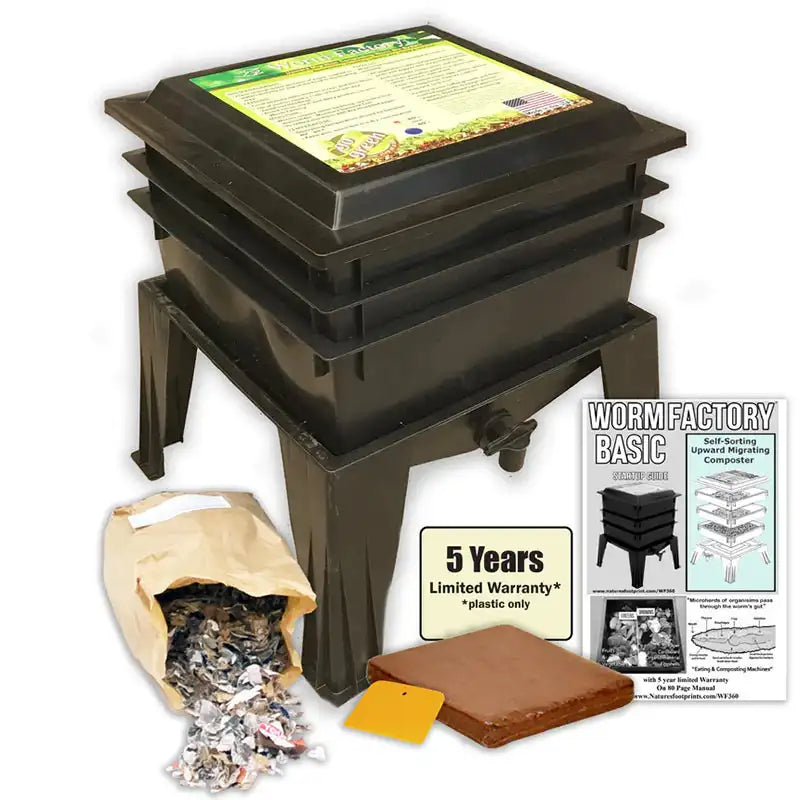Handling Worm Poop Over the Winter
Q. Christopher in Fribourg, Switzerland writes: "I have a question I've been wanting to ask you for some time. I have two worm bins and never know what to do with the compost that they produce during the Fall and Winter. No matter where I store the finished castings, on the balcony or in the basement, they begin to develop a nasty smell rather quickly. Should I just find a place in the garden where I can pile it all up during the cold season? Will it leech nutrients if stored that way? Is it safe to use smelly compost? The same questions apply for the compost tea that is produced."
A. This is a situation I know well, as all of my kitchen scraps are recycled through the stackable worm bin that sits on our insulated enclosed porch; and while things do seem to slow down a bit in winter, you still have to harvest the finished material to make room for fresh garbage to make sure that your worms have enough new food to eat.
Although Chris is thousands of miles away in Switzerland, a nation that many people think is freezing cold most of the time, the answers to his question are totally applicable to most US gardeners, because winters are milder in Fribourg than you might think. Their normal winter lows are 27 degrees F., and it rarely drops below 18 F°, which is about the same (or maybe even slightly warmer) than my Lehigh Valley garden most years.
And that makes these options workable for winter worm-wranglers just about everywhere.
No matter what, try and wait for a warm spell to take your finished worm compost outside (daytime temps in the 40s or above); to try and keep any worms that are still rooting around in your finished material alive for a while after they go out to the garden or compost or whatever.
#1 choice: Incorporate the finished worm castings into one or more of your compost bins. This is the choice of choices for the truly cold months of January and February; and it works especially well if you have professionally made bins with locking lids; both to keep vermin out and keep the contents warm enough for any live worms to have a decent chance of staying alive and working. No matter what, You MUST have extra shredded leaves on hand to cover the newly-incorporated worm castings (aka worm poop), which you should mix in as well as possible.
#1a: Same goes for the worm tea that comes out the spout that all worm bins should have at the bottom. An outdoor compost shouldn't be open to the weather; which can cause the contents to get a little dry over the winter--and what better substance to provide that needed moisture than the nutrient-rich liquid from a worm bin? Piles that are open to the elements are generally going to have good moisture levels from rain and snow--just remember that open piles produce compost much more slowly than sealed ones that are designed to hold in their heat. That's why purchased bins are made of BLACK plastic, a color that absorbs the maximum amount of heat on a sunny winter's day.
No matter what, be sure to keep a couple bags of shredded leaves inside your garage or other warm area to use when needed.
#2: Houseplants. First, let's make this clear: Most houseplants should NOT be fed over the winter, because they are dormant and the food is wasted. But some exceptions, like Meyer lemons and other citrus that go outdoors in the summer and back inside for the winter, ARE actively growing in the off-season and would love some natural feeding. I recommend placing an inch or two of worm castings on the surface of their soil, or watering the plants with worm tea every two weeks or so. (Always dilute worm water 50/50 with clean water before you pour.)
#2a: Feeding your springtime starts of tomatoes, peppers and such. For many years I didn't really feed the baby tomato and pepper plants I was starting from seed and all went pretty well. Then I decided to give them some diluted worm water feedings along the way and all went better (except for the Terrible Tomato Tragedy of 2018, which did not involve feeding and of which we will not speak again).
So, if you start your own seeds, I suggest you water their soil with diluted worm tea weekly beginning about three weeks after the sprouts appear above the soil.
#3: Experiment with refrigeration. Scoop your finished worm bin material into quart-sized lidded containers (like the ones used for take-out Hot and Sour soup), punch a few small holes into the tops of the lids and put the containers in the warmest part of your fridge. This should buy you enough time to get to the next non-freezing stretch of weather.
And finally, about that nasty smell: Do not use stinky worm castings or tea or even straight compost directly on your plants. Instead, mix the fetid material into one of your outdoor piles that's moving along slowly.
A. This is a situation I know well, as all of my kitchen scraps are recycled through the stackable worm bin that sits on our insulated enclosed porch; and while things do seem to slow down a bit in winter, you still have to harvest the finished material to make room for fresh garbage to make sure that your worms have enough new food to eat.
Although Chris is thousands of miles away in Switzerland, a nation that many people think is freezing cold most of the time, the answers to his question are totally applicable to most US gardeners, because winters are milder in Fribourg than you might think. Their normal winter lows are 27 degrees F., and it rarely drops below 18 F°, which is about the same (or maybe even slightly warmer) than my Lehigh Valley garden most years.
And that makes these options workable for winter worm-wranglers just about everywhere.
No matter what, try and wait for a warm spell to take your finished worm compost outside (daytime temps in the 40s or above); to try and keep any worms that are still rooting around in your finished material alive for a while after they go out to the garden or compost or whatever.
#1 choice: Incorporate the finished worm castings into one or more of your compost bins. This is the choice of choices for the truly cold months of January and February; and it works especially well if you have professionally made bins with locking lids; both to keep vermin out and keep the contents warm enough for any live worms to have a decent chance of staying alive and working. No matter what, You MUST have extra shredded leaves on hand to cover the newly-incorporated worm castings (aka worm poop), which you should mix in as well as possible.
#1a: Same goes for the worm tea that comes out the spout that all worm bins should have at the bottom. An outdoor compost shouldn't be open to the weather; which can cause the contents to get a little dry over the winter--and what better substance to provide that needed moisture than the nutrient-rich liquid from a worm bin? Piles that are open to the elements are generally going to have good moisture levels from rain and snow--just remember that open piles produce compost much more slowly than sealed ones that are designed to hold in their heat. That's why purchased bins are made of BLACK plastic, a color that absorbs the maximum amount of heat on a sunny winter's day.
No matter what, be sure to keep a couple bags of shredded leaves inside your garage or other warm area to use when needed.
#2: Houseplants. First, let's make this clear: Most houseplants should NOT be fed over the winter, because they are dormant and the food is wasted. But some exceptions, like Meyer lemons and other citrus that go outdoors in the summer and back inside for the winter, ARE actively growing in the off-season and would love some natural feeding. I recommend placing an inch or two of worm castings on the surface of their soil, or watering the plants with worm tea every two weeks or so. (Always dilute worm water 50/50 with clean water before you pour.)
#2a: Feeding your springtime starts of tomatoes, peppers and such. For many years I didn't really feed the baby tomato and pepper plants I was starting from seed and all went pretty well. Then I decided to give them some diluted worm water feedings along the way and all went better (except for the Terrible Tomato Tragedy of 2018, which did not involve feeding and of which we will not speak again).
So, if you start your own seeds, I suggest you water their soil with diluted worm tea weekly beginning about three weeks after the sprouts appear above the soil.
#3: Experiment with refrigeration. Scoop your finished worm bin material into quart-sized lidded containers (like the ones used for take-out Hot and Sour soup), punch a few small holes into the tops of the lids and put the containers in the warmest part of your fridge. This should buy you enough time to get to the next non-freezing stretch of weather.
And finally, about that nasty smell: Do not use stinky worm castings or tea or even straight compost directly on your plants. Instead, mix the fetid material into one of your outdoor piles that's moving along slowly.


